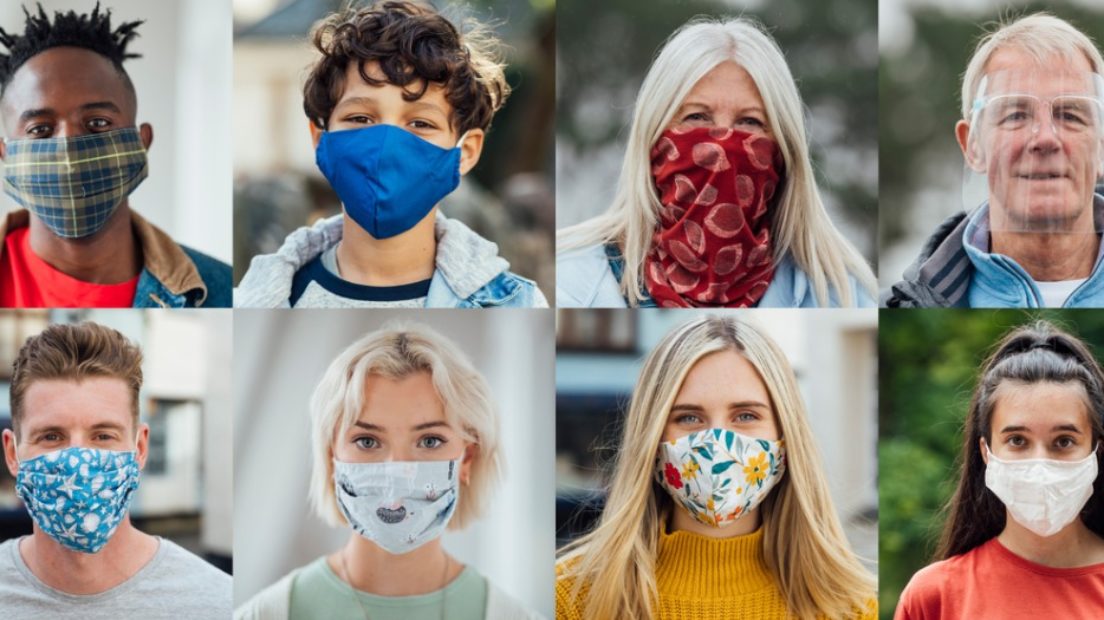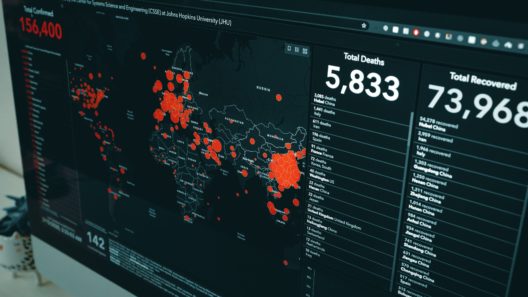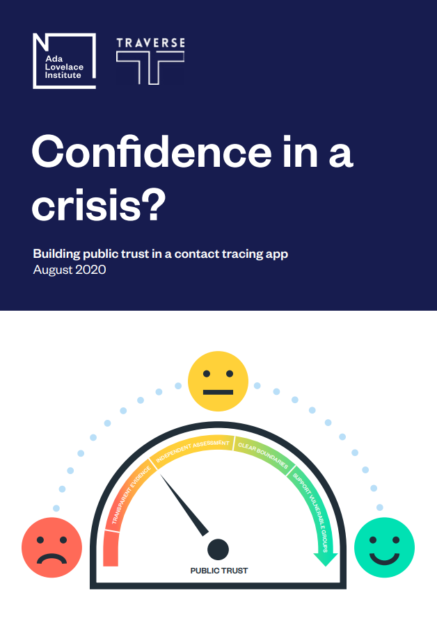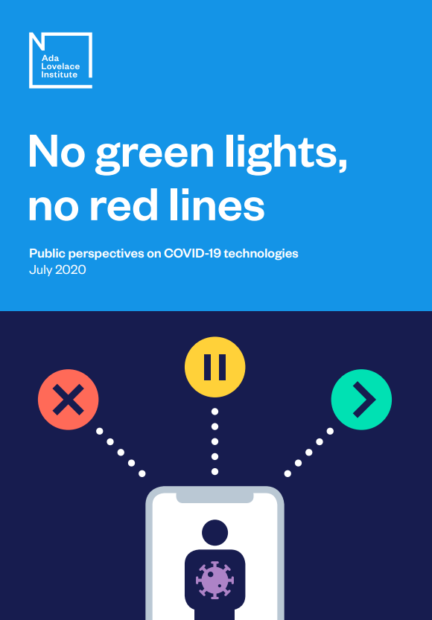Public attitudes to COVID-19, technology and inequality: a tracker
Tracking studies and projects that offer insight into people’s attitudes and perspectives to COVID-19, technology and inequality
5 March 2021
Reading time: 12 minutes

Health, digital and societal inequalities resulting from, and interacting with the coronavirus pandemic must be urgently addressed to ensure more equitable and just outcomes for everyone. Understanding how people think and feel about these issues is crucial to addressing them, and informs our projects on data and AI in relation to health and COVID-19.
This page shares information from the Ada Lovelace Institute’s work to follow studies and projects that offer insight into people’s attitudes and perspectives to COVID-19, technology and inequality.
This page was last updated on 18 May 2021. Please get in touch if you are aware of any updates or additions we should include. Let us know by contacting Aidan Peppin via apeppin@adalovelaceinstitute.org.
Putting good into practice: A public dialogue on making public benefit assessments when using health and care data
Understanding Patient Data and the National Data Guardian’s Office
Status: completed
Published: April 2021
Fieldwork: August – December 2020
Type: deliberative
Method: online deliberation with over 100 people from around the UK.
Summary: this dialogue convened more than 100 members of the public to discuss how to make sure that health and care data is used in ways that benefit people and society. It found that transparency around the purpose and aim of data use, as well as how data is used is key to ensuring public benefit is realised.
NHS COVID-19 app: early adopter evaluation report
NHS Digital, Department of Health and Social Care
Status: completed
Published: April 2021
Fieldwork: August – September 2020
Type: quantitative
Method: telephone and online surveys with early users of the NHS Test & Trace app, during the IoW trial.
Summary: as part of a formal evaluation of the NHS Test and Trace app during its trial on the Isle of White in Summer 2020, the NHS COVID-19 App programme commissioned a series of telephone and online surveys of users and NHS staff. Among their findings, the surveys reported that those who did download the app mostly found it very easy to use, and were motivated to use the app to better understand their own risk of coronavirus. Of those who didn’t download the app, a range of reasons were given, including simply not wanting to use the app and concerns about privacy or efficacy. Users from the Isle of White and NHS Volunteers were much more comfortable sharing data with the NHS app vs users from Newham, in London.
Coronavirus and the social impacts on Great Britain
Office for National Statistics
Status: ongoing
Most recent update: April 2021
Fieldwork: weekly since March 2020
Type: quantitative
Method: a weekly poll of 4000-4500 UK adults, via the ONS Opinions and Lifestyles survey.
Summary: since March 2020, the ONS has run the Opinions and Lifestyle Survey weekly, to understand the impact of the coronavirus pandemic on people, households and communities in Great Britain. The findings cover a wide range of issues.
COVID-19 repository and public attitudes retrospective
Centre for Data Ethics and Innovation
Status: completed
Published: March 2021
Fieldwork: June – December 2020
Type: quantitative
Method: a longitudinal survey, covering 12, 113 individuals and representing all regions of the UK.
Summary: a survey on the use of AI and data-driven technology in the UK’s COVID-19 response. The results suggest significant public support for the use of data-driven technology to help combat the immediate public health crisis, and to mitigate the wider effects of lockdown. However, many respondents also felt that the potential of data-driven technology was not being fully realised. They find that trust in the rules and regulations governing technology is the single biggest predictor of whether someone believes that digital technology has a role to play in the COVID-19 response.
The data divide
Ada Lovelace Institute
Status: completed
Published: March 2021
Fieldwork: February 2021
Type: quantitative
Method: survey of 2,023 UK adults looking at people’s experiences of health technology and care during covid.
Summary: this survey was part of the Ada Lovelace Institute’s project in partnership with the Health Foundation, exploring how the accelerated adoption of data-driven technologies and systems during the pandemic may have affected inequalities. The survey found a ‘data divide’ that could affect health inequalities according to people’s digital literacy, access to health-related technologies and other socio-economic factors.
Coronavirus diaries
BritainThinks
Status: ongoing
Most recent update: February 2021
Fieldwork: periodically since April 2020
Type: mixed
Method: longitudinal diary, focus group and poll study, with 50 people from around the UK.
Summary: since April 2020, BritainThinks has worked with members of the public to understand their experience of the crisis, through a series of online focus groups, diary-keeping and polling. They have run several fieldwork series and completed reports following these. As of 21 February 2021, BritainThinks reported that people’s emotional resilience was stretched, and the public was hoping for a future post-pandemic where society is fairer – but they did not feel this was achievable.
COVID-19 behaviour tracker
Institute of Global Health Innovation, Imperial College London and YouGov
Status: ongoing
Most recent update: February 2021
Fieldwork: weekly since April 2020
Type: quantitative
Method: a global survey across 29 countries, sample size 30,000.
Summary: Imperial College London and YouGov have partnered to survey behaviour and compliance with public health measures across various countries in relation to COVID-19.
Engaging with Black and South Asian people on equitable data collection
Understanding Patient Data
Status: commissioning
Published: February 2021
Type: qualitative
Method: a series of public engagement sessions with people from Black and South Asian backgrounds. The method is not yet defined.
Summary: Understanding Patient Data is commissioning a project to explore Black and South Asian people’s views on health data collection and use, understand what it means to be represented and learn about people’s questions, concerns and aspirations.
Kantar UK barometer
Kantar
Status: completed
Published: February 2021
Fieldwork: February 2021
Type: quantitative
Method: online, nationally representative survey of 1,114 UK adults.
Summary: Kantar surveyed public attitudes on government handling of COVID-19. 77% of respondents say they would have a vaccine, and 63% support the introduction of a vaccine passport to enable overseas travel this summer. Older groups are most supportive of vaccine passports for international travel (81% of over 65s support), compared to only half of those aged 18-34 supporting the idea. Attitudes are split on whether or not vaccines should be mandatory.
Public opinion & vaccine passports in the UK
Serco Institute
Status: completed
Published: February 2021
Fieldwork: February 2021
Type: quantitative
Method: online, nationally representative survey of 1,003 UK adults.
Summary: a survey of attitudes to the use of vaccine passports, assuming ‘appropriate protections and exemptions for people who are precluded from taking the vaccine due to medical conditions’ were in place. Found broad support for vaccine passports across a range of settings: international travel, hospitality, events, workplaces, retail, social gatherings and places of worship. Support is highest for international travel and lowest for retail. Strong support is highest among older age groups. The authors note small differences across Conservative or Labour voters, and do not note differences across other demographic factors. The authors note that ‘legal, ethical and practical issues’ must be considered alongside public opinion.
UK COVID-19 social study
Daisy Fancourt et al., University College London
Status: ongoing
Most recent update: April 2021
Fieldwork: weekly since March 2020
Type: quantitative
Method: a longitudinal study with a weekly online survey of 70,000 self-selected participants across the UK.
Summary: the COVID-19 social study aims to understand the social and psychological impact of coronavirus and the measures introduced to tackle it, such as lockdown and social distancing. Each week the panel is surveyed, and the research team share findings on psychological response and other issues such as experience of lockdown, adherence to the rules, financial impact and more.
Unequal Britain
Bobby Duffy et al. Policy Institute, Kings College London
Status: completed
Published: February 2021
Fieldwork: November 2020
Type: quantitative
Method: online, nationally representative survey of 2,226 UK adults. Survey was conducted by YouGov.
Summary: researchers survey the public on attitudes towards societal inequality in light of COVID-19. Inequalities between more and less deprived areas, as well as income inequalities were seen as the most serious forms of inequality in the UK. Inequalities across ethnic groups was seen as a serious concern, but attitudes towards this varied between different political, economic and ethnic demographics.
Public acceptance of privacy-encroaching policies to address the COVID-19 pandemic in the United Kingdom
Stephan Lewandowsky et al.
Status: completed
Published: January 2021
Fieldwork: June – July 2020
Type: quantitative
Method: a survey of attitudes to differing track and trace scenarios. 3,500 participants across two waves.
Summary: the study looked at different hypothetical examples of track and trace apps, based on what government plans and media reports at the time suggested could be likely. The scenarios had varying levels of privacy invasion and mandating by government. At the time of the survey, a majority of people reported support for tracing-based policies and immunity passport schemes. While respondents appeared comfortable trading privacy for public health benefit, they expressed a desire for sunset clauses that would limit the time-use of any collected data. The report is part of a larger project.
Citizens’ attitudes to contact tracing apps
Laszlo Horvath, Susan Banducci, Oliver James
Status: completed
Published: September 2020
Fieldwork: May 2020
Type: quantitative
Method: a choice-experiment survey. 2,300 UK participants across two studies.
Summary: researchers looked at attitudes towards different contact tracing methods. They found that privacy preservation concerns were overridden by trust in the NHS, and an NHS app is preferred to a government app, whether centralised or decentralised.
Lockdown debate
Ada Lovelace Institute
Status: completed
Published: August 2020
Fieldwork: May – June 2020
Type: deliberative
Method: online, deliberation via a ‘mini public’ of 28 UK adults from London and Kent.
Summary: Ada Lovelace Institute partnered with Traverse, Involve and Bang the Table to deliver a rapid online discussion on the question ‘under what circumstances do citizens think that technological solutions like the COVID-19 contact tracing app are appropriate?’ We found that transparency of evidence, independent assessment, clear boundaries on data use and proactive inclusion of vulnerable groups were priorities.
Public perceptions of health and social care in light of COVID-19
Health Foundation and IPSOS Mori
Status: completed
Published: July 2020
Fieldwork: May 2020
Type: quantitative
Method: a telephone-based survey of approx. 1900 people from the UK.
Summary: this survey found that the proportion of people who believed the government has a responsibility for ensuring people stay healthy increased to 86%, from 61% in 2018. Financial impacts of the virus and of lockdown risk people’s long-term health and wellbeing.
Public attitudes to COVID-19 contact tracing based apps: a UK-based focus group study
Simon Williams et al.
Status: completed
Published: June 2020
Fieldwork: May 2020
Type: qualitative
Method: five online focus groups, with 22 people in total, representing a range of genders, ages, ethnicities and locations.
Summary: in this study, researchers aimed to explore public attitudes to the proposed COVID-19 contact tracing app in the United Kingdom. Findings revealed five main themes: lack of information, concerns around privacy, concerns about stigmatisation, concerns about uptake, and contact tracing as ‘the greater good’.
Trust in COVID tech poll
Centre for Data Ethics and Innovation (CDEI)
Status: completed
Published: June 2020
Fieldwork: June 2020
Type: quantitative
Method: a survey of public attitudes towards the use of technology in response to COVID-19.
Summary: at the time of the study, 73% of people felt that technology had the potential to be used in addressing COVID-19, but that potential wasn’t always realised. Only 6% of people felt technology is making the situation worse. Many respondents gave a neutral response to many questions, suggesting uncertainty, lack of awareness or disengagement with the issues.
Related content

Tackling health and social inequalities in data-driven systems
Research to examine the interaction between data-driven systems and health and social inequalities, in the wake of COVID-19.

Rapid, online deliberation on COVID-19 technologies
Rapid, online deliberation with 28 members of the public on COVID-19 exit strategies.

Confidence in a crisis?
Findings of a public online deliberation project on attitudes to the use of COVID-19 related technologies for transitioning out of lockdown

No green lights, no red lines
Lessons to assist Government and policymakers navigating difficult dilemmas when deploying data-driven technologies to manage the pandemic